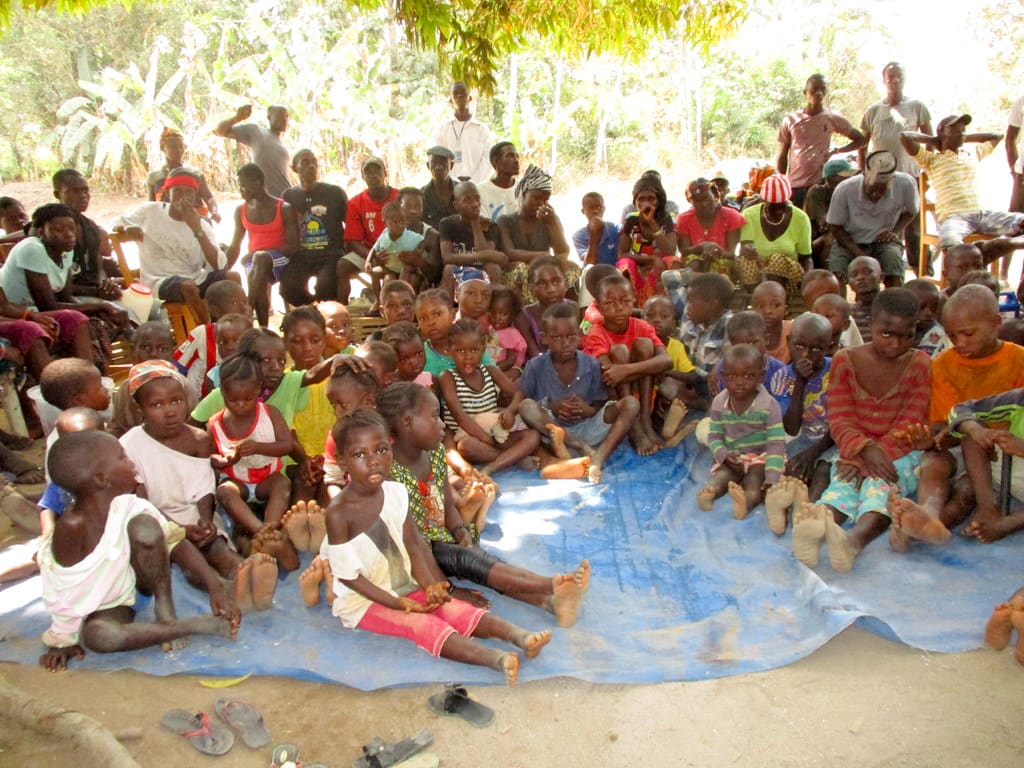It is a bright, sunny day for our first visit to Kolia. The community is surrounded by vegetation; the same kind of lush green fronds and trees lining the dirt road we took. This green area is dotted with swamps, which makes this area good for farming. There are about 27 different households here, all made of mud blocks lining the main road. The only building of note, beside the homes, is a small mosque.
The days start early before 5:30am prayers. This community is particularly unified because they all share the same Muslim faith. There is no school, clinic, or covered market. Most people depend on farming. There is little food to sell or trade since most of what they use most of what they produce to feed their families.
Water
Getting ready in the morning always begins with fetching water. Children and women are at the swamp with their plastic jerrycans or buckets. The community cleared a lot of the brush away from the pathway and the swamp itself to keep it as clean as possible.
Most often a woman or child will wade into the swamp's water to find what looks like the clearest, cleanest water. However, all of this water is contaminated. Animals come and go as they please, many of them carrying diseases that are deadly to humans. People bathe at the source, as well as bring their laundry or dishes to clean.
The water level in these swamps drops dramatically between the dry months of March and April, forcing the men to come and dig holes to find water.
Sanitation
Fewer than half of households have a pit latrine. Those who don't have their own latrine opt for the bushes. There's isn't a container set aside for hand-washing, either.
"The current hygiene and sanitation in our community is not good. Children die very early because their food has dirt and contaminated water," Mr. Brima Kargbo said
Most families own animals, but only a few have a pen to keep their animals in. These animals are free to roam in and out of the home - even in the kitchen while there's cooking going on!
Here’s what we plan to do about it:
Training
There will be hygiene and sanitation training sessions offered for three days in a row.
The hygiene and sanitation trainer decided it would be best to teach community members the importance of building a latrine, how to build a hand-washing station, and more. They will also teach about other tools like dish racks and the importance of properly penning in animals. Pictures will be used to teach the community how to discern between healthy and unhealthy hygiene and sanitation practices.
These trainings will also result in a water user committee that manages and maintains the new well. They will enforce proper behavior and report to us whenever they need our help solving a serious problem, like a pump breakdown.
Borehole
The community will be meeting together to determine the best location for their new well, and then we’ll confirm the viability of their choice.
Our team will drive over the LS200 mud rotary drill rig and set up camp for a couple of nights. Once the well is drilled to a sufficient water column, it will be cased, developed, and then tested. If these tests are positive, our mechanics will install a new India Mark II pump.
This community has been drinking dirty swamp water and suffering the consequences. By drilling this borehole, Kolia Community will be provided with plenty of safe, clean drinking water.
This project is a part of our shared program with Mariatu’s Hope. Our team is pleased to provide the reports for this project (formatted and edited for readability) thanks to the hard work of our friends in Sierra Leone.

 Borehole Well and Hand Pump
Borehole Well and Hand Pump
 Rehabilitation Project
Rehabilitation Project

























